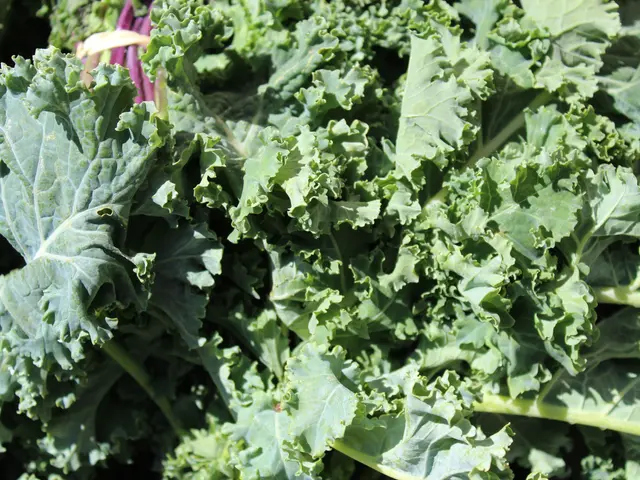Improving Mental Health Through Diet: Top 5 Essential Foods
A growing body of research suggests that certain foods can have a profound impact on mental wellness, reducing symptoms of depression, anxiety, and stress. Here's a breakdown of the key nutrients and food sources that contribute to a brain-healthy diet.
Essential Nutrients for Mental Wellness
- Omega-3 Fatty Acids - Found in fatty fish (salmon, mackerel), flaxseeds, and walnuts, these fats have anti-inflammatory properties, support brain cell membranes, and improve mood regulation [1][3][4].
- B Vitamins (B6, B12, folate) - Critical for producing neurotransmitters like serotonin and dopamine, these vitamins are found in leafy greens, beans, whole grains, fortified cereals, eggs, and dairy [1][3][4].
- Vitamin D - Linked to improved mood and reduction in depression symptoms, Vitamin D is mainly obtained from sun exposure and fortified foods [1].
- Magnesium and Zinc - Important minerals for brain function and emotional regulation, found in nuts, seeds, and legumes. Magnesium also helps relieve anxiety [1][4].
- Antioxidants - Present in berries, nuts, dark chocolate, and a variety of fruits and vegetables, antioxidants protect brain cells from oxidative stress and inflammation, supporting mental health and cognitive function [1][4].
- Dietary Protein (essential amino acids) - Protein supplies tryptophan, phenylalanine, and tyrosine, crucial for synthesizing serotonin and dopamine neurotransmitters. Both plant and animal proteins can be beneficial, though plant proteins are associated with lower risk of mental disorders [2].
- Fermented Foods - Provide probiotics that support a healthy gut microbiome, which influences brain health and mood via the gut-brain axis [5].
- Hydration - Adequate water intake and consumption of high-water content foods prevent cognitive impairment related to dehydration [3].
Food Sources and Benefits
- Sardines contain a perfect combination of brain-supporting nutrients but are often overlooked due to concerns about mercury and other contaminants in larger fish species.
- Berries reach peak antioxidant concentrations during summer, providing maximum neuroprotective benefits. Fresh herbs like basil, mint, and cilantro contribute volatile compounds that may influence mood and cognitive function.
- Walnuts are associated with significantly lower depression rates. Fermented foods like kimchi, sauerkraut, kefir, and yogurt provide beneficial bacteria that directly influence neurotransmitter production in your gut.
- Shellfish like oysters and mussels rank highest on the Antidepressant Food Score and provide significant psychological benefits, but are rarely found in mainstream mental health recommendations.
- Legume-based meals offer unique mental health advantages through their combination of plant protein, fiber, and mood-supporting minerals.
- Dinner choices significantly impact both sleep quality and next-day mood. Tryptophan-rich foods like turkey, pumpkin seeds, and tart cherries support melatonin production for better sleep, and magnesium-rich options like dark leafy greens and nuts promote muscle relaxation and nervous system calm.
The Mediterranean Diet and Mental Wellness
The Mediterranean diet, rich in these components, is noted for its mood-enhancing effects. Together, these nutrients and foods form a dietary pattern that supports brain health by improving neurotransmission, reducing inflammation, protecting neurons, and maintaining gut-brain communication, all of which can help reduce depression, anxiety, and stress symptoms.
Consistency is Key
Remember, consistency trumps perfection in nutrition for mental wellness. Regular consumption of brain-supporting foods creates cumulative benefits that compound over time. So, incorporate these nutrient-dense foods into your daily meals to reap the rewards of a brain-healthy diet.
[1] https://www.ncbi.nlm.nih.gov/pmc/articles/PMC3665026/ [2] https://www.ncbi.nlm.nih.gov/pmc/articles/PMC6323893/ [3] https://www.ncbi.nlm.nih.gov/pmc/articles/PMC5575806/ [4] https://www.ncbi.nlm.nih.gov/pmc/articles/PMC4145620/ [5] https://www.ncbi.nlm.nih.gov/pmc/articles/PMC6292418/
Read also:
- Persisting Myth about Lightning Safety Continues to Pose Risks Despite Disproving
- Catastrophic blast at US Steel facility in Pennsylvania claims two lives, injures ten individuals
- Swiss sleep monitoring platform facilitates proactive identification of impending COVID-19 flare-ups
- Uniclinics Predicted to Face Financial Shortfall Amounting to Millions in 2025






